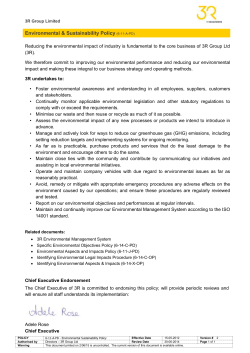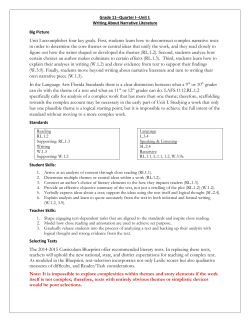
Prof. Dr. Bernhard Gill, MA Anna Wolff Sommer 2015 Transition
Prof. Dr. Bernhard Gill, MA Anna Wolff Sommer 2015 Transition theories Tuesday 10-12 Uhr Konradstrasse 6, room 308 How did transitions of economic systems and their specific infrastructures evolve in the past and how could they be initiated presently? How did the large transitions from hunter-gatherer to agricultural, and later on from agricultural to industrial economies take place? How have transport, agriculture and energy systems evolved or have been deliberately changed during the last two hundred years? During the course, these questions are approached from different theoretical and interdisciplinary perspectives: Transitions theory as introduced by the Dutch school (Geels, Rotmans et al.), evolutionary economics, discourse theory, ecological resilience theory, history of technology and economic history. The guiding question will be a practical one: What can be learned from history for the ongoing or projected socio-ecological transitions like “Energiewende”? Schedule Downloads: schedule for print 14.04. Introduction 21.04. Physical and social change: the larger historical perspective (AW) Slides 1 *Sieferle, Rolf-Peter (2011): "Cultural evolution and social metabolism", Geografiska Annaler: Series B, Human Geography 93 (4): 315–324. Text 1a schedule of "prefered discussion partners" (to be opened with the password of the course) Nolan, P. & Lenski, G. (2011) Human Societies. An Introduction to Macrosociology. Cap. 1 + 3, Colorado. 28.04. Power and discourse (AW) Text 1b Slides 2 *Boltanski, Luc & Chiapello, Eve (2005): “The new Spirit of Capitalism”. International Journal of Politics, Text 2a Culture, and Society 18, 161-188. Text 2b Sewell, William (1992): “A Theory of Structure: Duality, Agency, and Transformation”. American Journal of Sociology 98.1, 1-29. 05.05. Evolutionary Economics (BG) Slides 3 *Dosi, Giovanni, and Richard R. Nelson. "An introduction to evolutionary theories in economics." Journal Text 3a of evolutionary economics 4.3 (1994): 153-172. Text 3b Andersen, Esben Sloth. Evolutionary Economics : Post-Schumpeterian Contributions. Routledge, 2013. Chap. 1: Approaching evolutionary economics. 12.05. Case studies (BG) Slides 4 *Fuenfschilling, Lea, and Bernhard Truffer. "The structuration of socio-technical regimes—Conceptual foundations from institutional theory." Research Policy 43.4 (2014): 772-791. Text 4a Geels, Frank W., and René Kemp. "Dynamics in socio-technical systems: Typology of change processes and contrasting case studies." Technology in society 29.4 (2007): 441-455. 19.05. Structural change: Industrialisation (BG) Text 4b Slides 5 *Bourdieu, Pierre (2013): Algerian Scetches, Polity Press, Chap.1: Colonization, culture and society, pp. 39- Text 5a 82 Text 5b Weber, Eugen (1976). Peasants into Frenchmen: the modernization of rural France, 1870-1914. Stanford University Press. Chap. 8: The working of the land, pp. 115-129. 26.05.(Pfingsten) 02.06. Transitions in consumption (AW) Slides 6 *Schrage, Dominik (2012): “The Availability of Things. A Short Genealogy of Consumption”. Krisis 1, 519. Text 6a Chai, Andreas & Moneta, Alessio (2010):”Retrospectives. Engel Curves”. Journal of Economic Perspectives, 24.1, 225-240. 09.06. Cultural change: From frugality to affluence and back again? (AW) Slides 7 *Podkalicka, A., & Potts, J. (2013). Towards a general theory of thrift. International Journal of Cultural Studies, DOI: 10.1177/1367877913496198 (pp.1-15). Text 7a Witkowski, T. H. (2010). A brief history of frugality discourses in the United States. Consumption, Markets and Culture, 13(3), 235-258. 16.06. Slides 8 *Geels, Frank W. (2010): “Ontologies, socio-technical transitions (to sustainability), and the multi-level perspective“. Research Policy 39, 495-510. Text 8a Slides 9 *Garud, Raghu, and Joel Gehman. "Metatheoretical perspectives on sustainability journeys: Evolutionary, relational and durational." Research Policy 41.6 (2012): 980-995. Text 9a Slides 10 *Coenen, Lars, Paul Benneworth, and Bernhard Truffer. "Toward a spatial perspective on sustainability transitions." Research Policy 41.6 (2012): 968-979. Text 10a Text 10b Vulnerability and Resilience – adaptation through crisis and revolution (BG) Slides 11 *Gallopín, Gilberto C. "Linkages between vulnerability, resilience, and adaptive capacity." Global environmental change 16.3 (2006): 293-303. Text 11a Holling, C. S., & Sanderson. S. (1996). Dynamics of (dis) harmony in ecological and social systems. Holling et al. (Eds.), Rights to Nature: Ecological. Economic, Cultural, and Political Principles of Institutions for the Environment, 57-86. 14.07. Text 9b Sustainability transitions in geographic perspective (BG) Murphy, J., and Smith, A. (2013) Understanding transition-periphery dynamics: renewable energy in the Highlands and Islands of Scotland. Environment and Planning A, 45 (3). pp. 691-709. 07.07. Text 8b Research strategies for sustainability transitions (BG) Markard, Jochen, Rob Raven, and Bernhard Truffer. "Sustainability transitions: An emerging field of research and its prospects." Research Policy 41.6 (2012): 955-967. 30.06. Text 7b Transition theory (MLP) and critique (AW) Shove, Elizabeth & Walker, Gordon (2010): “Governing transitions in the sustainability of everyday life” Research Policy 39, 471-476. 23.06. Text 6b Text 11b Summary, ideas for term papers, seminar critique The slides and texts for the respective meeting can be downloaded via the links in the WWW (see above). Password will be communicated in the course. How to get certificates 9 ECTS (BA/MA seminar): - not missing more than two meetings - reading the main texts (marked with asterisks*) for each meeting - writing a summary of one page to the main text for each meeting (minus two) - containing also a question for discussion (due via email at 12.00 p.m. on Sunday before the respective meeting). (=Task 1) - being two times a "preferred discussion partner" – this means that you have carefully red all the texts for the respective meeting (not only the texts with the asterisks*) (=Task 2) - writing a term paper to the usual conditions for Seminare. The deadline for the term paper is the 21th of september 2015. Term papers are to be sent via email in pdf-format (please no paper version). Do not forget to include a scan of the declaration of academic honesty with your signature! (=Task 3) Environment and Society Programme: - not missing more than two meetings - reading the main texts (marked with asterisks*) for each meeting - being two times a "preferred discussion partner" – this means that you have carefully red all the texts for the respective meeting (not only the texts with the asterisks*) and that you are able to summarize – on request – the main arguments in these texts. International Programme Students (e.g. Erasmus): Depending on the requirements of your home university you can choose for passing 3, 6 or 9 ECTS by fulfilling tasks 1, 1+2 or 1+2+3 in the above "menu". Our consultation hours / email: Prof. Dr. Bernhard Gill, Tuesday, 0-1 p.m., room 201 at Konradstrasse 6, or after the course meeting Bernhard.Gill(at)soziologie.uni-muenchen.de Anna.Wolff(at)soziologie.uni-muenchen.de Please send all communications always to both instructors!
© Copyright 2025












